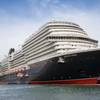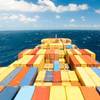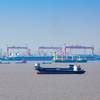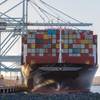by John W. Waterhouse, P.E., President, Elliott Bay Design Group
As a designer of ships, and president of a vessel design company, I know the shipbuilding industry is made up of people who recognize the importance of ferries, cruise ships and other maritime vessels to our economy. These same people also care a great deal about the marine environment in which our ships operate.
That's why reports by environmental groups criticizing the marine industry for supposed ecological offenses leave a bad taste in the mouths of those who know the whole story. For example, a recent report on cruise ships by the Oceans Conservancy (Hertz and Davis, Cruise Control, May 2004) states, "Some of the pollutants generated by these giant ships daily include as much as 37,000 gallons of oily bilge water…." What the article fails to mention is that stringent laws are in place that require such ships to first separate the oil, then process and treat the bilge water before its discharge. Anything less is a violation of the law and subject to severe penalties.
Another recent report also provides a disservice to the shipbuilding industry. A story in the Blue Water Network ("Fast Ferries: Clean Water Transit or More Dirty Diesel?") states: "Speeding across waterways, fast ferries spew more dangerous pollutants into the air than either cars or transit buses - four to nine times more per passenger mile. "This statement assumes that all cars and transit busses are operating at peak efficiency – buzzing along a highway with a full load of passengers. Fact is, stop-and-go traffic greatly reduces fuel efficiency, and busses that are running empty or with partial loads are far from optimal. Compare this picture with a ship unencumbered by stop lights, traffic jams and rush hour traffic, and the story becomes quite different.
One-sided reports such as these, which are often built on half-truths or exaggerations, serve only to fan the flames among a general public often willing to accept such statements without further investigation. The marine industry is left bruised, frustrated, and often sorely misrepresented.
Finding middle ground
Despite my personal and professional involvement in the maritime trade, I am not an uncritical observer of our industry. I treasure the marine environment and want to see my customers use the best available technologies and operating practices to ensure that it is protected. We can always work together to improve our care and concern for the Earth. People who deliberately choose to ignore the regulations are criminals and should rightly be penalized.
Somewhere between apathy and anger lies a middle ground – a place where environmental supporters and marine industry leaders work together. To be guardians of the environment does not mean that we abandon modern shipping and go back to biodegradable vessels with wooden hulls and flax sails. Nor does it mean that people using the water to move goods or people in exchange for money are evil, greedy folks with hearts of stone.
Nature is about balance. Hot versus cold, wet versus dry, predator versus prey, light alternating with dark. Nature has demonstrated to the human race that balance is essential for a sustainable ecosystem. We should seek the same balance in our discussions about the environment and how to deal with issues such as diesel exhaust emissions, overboard discharges, anti-fouling coatings, and waste stream management. A reasoned discussion based on facts is essential to progress. Name calling and distortions only impede progress.
We are indeed seeing some real advances. The cruise industry recently signed a memorandum of understanding with Washington State that will self-regulate the discharge of black and gray water. The tug and barge industry has been working with the U.S. Coast Guard on crew endurance and fatigue prevention which is important for safety as well as for the environment. Some shipping companies are testing various technologies for ballast water treatment in order to prevent the introduction of non-indigenous species into bodies of water such as the Great Lakes or Puget Sound. Internationally, we have regulations that prohibit the discharge of oil and plastic, and control the discharge of garbage and sewage. I would like to see both the environmental groups and the marine industry continue to build upon these improvements.
So how do we go forward? First, I would advocate that the environmental groups investigating the marine industry seek input from independent professional bodies such as the Society of Naval Architects and Marine Engineers. This would keep the issues focused on facts rather than hyperbole. The various marine associations should, in turn, reach out to the environmental community to gain a different perspective on their operations and practices. I note that the International Council of Cruise Lines has led the way through their joint initiative with Conservation International. I would like to see the American Waterways Operators and the Intertanko undertake similar initiatives. Perhaps one of the parties, either marine or environmental, could host a conference to bring both sides together.
The Blue Planet deserves our respect. As an engineer, I believe that we can use the oceans for commerce while we protect the environment. There will be cost impacts, but it's the right thing to do. I also believe that we can have a civil discourse that draws upon facts and represents truth. Come on board so we can work together.
Sponsored Content
Chris-Marine’s solutions help to prolong engine lifetime

Subscribe for
Maritime Reporter E-News
Maritime Reporter E-News is the maritime industry's largest circulation and most authoritative ENews Service, delivered to your Email five times per week









